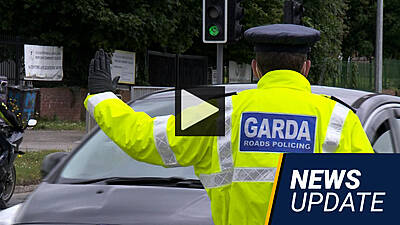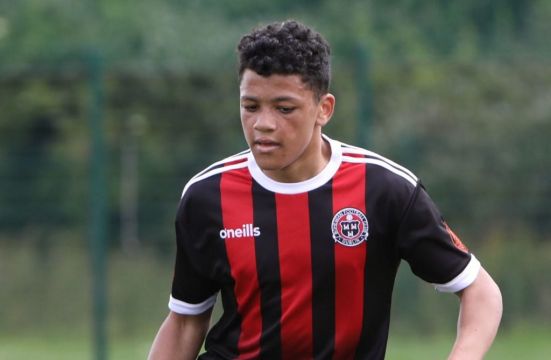A jury in the trial of a food-delivery cyclist accused of murdering teenager Josh Dunne have questioned why the "instigator" of the fatal row was not called to give evidence in the trial.
The jury at the Central Criminal Court had been sent out to begin their deliberations on Friday but returned shortly afterwards with a list of questions.
They said that they had heard from "everyone" except one of the people who assaulted the accused's friend and a man on a moped who stole a bike belonging to another delivery cyclist.
The trial heard that George Gonzaga Bento and his friend Guilherme Quieroz followed the man on the moped and when they tried to retrieve the bike there was a standoff before a group of teenagers arrived and assaulted Mr Bento and his friend. The prosecution described the man on the moped as the "instigator" and a "thug" whose actions should be condemned, but he was not called as a witness.
Mr Justice Paul Burns told the jury that they must determine the issue based on the evidence that has been presented and "that's that". He told them not to speculate about other evidence or other possibilities.
The jury also asked whether there was a "legal reason" why they had not seen pictures of injuries Mr Quieroz said he suffered during the assault. Mr Justice Burns told the jury that "the evidence is what it is and you just have to deal with the evidence that you have.
Self-defence
The jury also wanted a definition of self-defence as it applies to a murder charge. Mr Justice Burns told them that if it is reasonably possible that the accused acted in defence of himself or another and used no more force than was necessary, then he should be found not guilty of murder.
Where a person used more force than was reasonably necessary but no more force than he honestly believed was necessary, the verdict is not guilty of murder but guilty of manslaughter. If the prosecution has proved beyond reasonable doubt that the accused knew the amount of force used was not reasonably necessary then he is guilty of murder.
Mr Bento (36), a Brazilian national with an address in East Wall in Dublin 3, is charged with murdering 16-year-old Josh Dunne at East Wall Road, East Wall on January 26th, 2021.
Mr Bento is also accused of producing a utility knife in a manner likely to intimidate another in the course of a dispute or fight. The defendant is further accused of assault causing harm to two other young men on the same occasion. The delivery cyclist has pleaded not guilty to each of the four counts.
The prosecution alleges that Mr Bento produced a knife during a "stand-off or confrontation" with the man on a moped who had stolen another delivery cyclist's bike. Josh Dunne and other youths arrived at the scene and got involved in the confrontation.
Before sending the jury out to begin their deliberations, Mr Justice Burns summarised the defence and prosecution cases. He said the prosecution accepts that Mr Bento and Mr Quieroz were acting lawfully in retrieving the stolen bike and were subjected to an unlawful attack by others.
Knife
However, the prosecution alleges that when Mr Bento first produced the knife to the man on the moped, before anyone else had arrived, he was not acting in self-defence but was being aggressive and "acting the hard man".
The prosecution also argues that the force he used after the teenagers arrived was not reasonable or necessary and neither he nor his friend were being beaten when he took out the knife a second time.
The prosecution has said that there was no need for Mr Bento to stab the first alleged victim as he could have just pushed him away. When he used the knife the second time the attackers were using only their fists, the prosecution said.
Mr Justice Burns said that the prosecution case in relation to the stabbing of Josh Dunne is that the youngster was unarmed and there was no need to use a knife against him. They also said that Josh must have seen Mr Bento using the knife against one of his friends and acted lawfully when he punched Mr Bento to defend himself and his friends.
The prosecution said that the third alleged victim had ceased attacking Mr Quieroz when the accused stabbed him in the back and the accused must have known that the use of the knife was excessive and unjustified in the circumstances.
The accused, Mr Justice Burns said, told them that he was acting in self-defence and was not looking for trouble but was trying to do the right thing for someone whose bike had been stolen. He said the defence had shown that the accused has never been in trouble in Brazil or Ireland.
They said that when Mr Bento first produced the knife he was reacting to a perceived threat from the man on the moped and pointed out that the Brazilians did not attack the man even though at that point they outnumbered him two-to-one.
CCTV
Mr Bento and Mr Quieroz had decided to leave but were prevented from doing so when the teens arrived and attacked them.
Mr Justice Burns reminded the jury that the defence had said that the use of the knife was justified given the level of assault and the serious risk of injury or even death that the assault posed to Mr Bento and his friend. They had pointed out that the assault happened quickly and that the prosecution's "frame by frame" analysis of CCTV footage was unrealistic.
Mr Justice Burns also told the jury there is no definition of reasonable force; the jury must decide for themselves what was reasonable in the circumstances. He asked them to consider the nature of the attack, whether weapons were used, the number of attackers and the speed, ferocity and duration.
Latitude
They should consider the "natural shock or fear such an attack would cause. Life is not lived on a frame-by-frame basis, there is no pause or replay button. A degree of latitude is to be afforded to the victim of an attack." He said a person defending themselves cannot "weigh out the exact measure" of what is a reasonable action.
He further told the jury that if they conclude that Mr Bento lied at any point, they should consider whether it is reasonably possible that the lie was unintentional.
If they are satisfied beyond reasonable doubt that a lie was intentional, he said that does not prove that the accused is guilty. "People lie for all sorts of innocent reasons," he said.

"The mere fact of a lie does not mean he is guilty of the offence. To rely on a lie it must be deliberate and not told for an innocent purpose but because he knew it [the truth] would implicate him in the offence."
He told the jury to consider each of the four counts separately and that any verdict they reach must be unanimous. In relation to the murder charge there are three possible verdicts: guilty of murder, not guilty of murder but guilty of manslaughter, or not guilty.
The 12 jurors spent about one hour considering their verdicts today (FRI) and will return on Monday.







